Lane Johnson shines a light on mental-health challenges in athletes | Expert Opinion
This month, Johnson, a three-time Pro Bowler and Super Bowl champion with the Eagles, shared that he has suffered from anxiety and depression for years.

Professional athletes can appear superhuman as they persist through injuries, such as Carson Wentz when he threw a touchdown on a torn ACL, or Donovan McNabb when he played a game on a broken ankle.
Some might even assume that this “invincibility” extends to elite athletes’ mental health — that they are immune to debilitating periods of sadness, self-doubt and worry.
But athletes, and research on their mental health, tell a very different story.
This month, Eagles tackle Lane Johnson, a three-time Pro Bowler and Super Bowl champion, shared that he has suffered from anxiety and depression for years. Olympic gold medalists Simone Biles and Michael Phelps have opened up about their own long-term battles with anxiety and depression. Cleveland Cavalier Kevin Love described his bout of depression as a feeling of being on a deserted island at midnight.
I recently moderated a discussion with former NFL veteran linebacker Ricky Sapp, who talked about becoming physically ill before games because of depression and anxiety, which his college coaches would write off as excitement. But the problem worsened when he transitioned into the NFL.
Jets coach “Rex Ryan said ‘You’re not playing for this team unless you talk to a therapist and you can be honest.’ I went to the therapist and told the truth,” said Sapp, who was drafted by the Eagles in 2010. “And it felt great. And that’s when I started to figure out my depression and anxiety.”
These players’ courage in coming forward is magnified in light of a sports culture that often idealizes toughness and encourages players to push through pain. Under the pressure of these norms, athletes can experience strong feelings of shame and a fear of being labeled as “weak” if they talk about their emotional vulnerabilities.
Studies suggest there are many more athletes who are fighting these internal battles — and staying silent about them.
A broad analysis conducted before the pandemic found that 34% of current elite athletes reported anxiety and depression symptoms. That would mean, on average, at any given time, 18 players on a 53-man NFL team could benefit from psychological help.
Feelings of anxiety and depression may go undetected, as well.
In one study of Olympic-caliber swimmers, 68% met the criteria for a major depressive episode. The rate of depression doubled among the top 25% of those athletes. This implies that the higher a competitor climbs in the sport, the greater the risk of experiencing significant mental distress.
To put these rates in perspective, the prevalence of depression symptoms among U.S. adults was 9% before the pandemic. For many athletes, COVID-19 has only added to their mental health challenges.
Generally, depressed athletes report not getting enough sleep, having troubling thoughts about the future, separation from family and friends, and concerns about weight.
Perfectionism, fear of failure, and basing self-worth on performance (also known as performance-based identity) can contribute to those difficulties. In a study of sports-related stressors, 73% of athletes had concerns about meeting high standards.
Elite athletes with a purpose-based identity, on the other hand, tend to be psychologically healthier. Their self-worth extends to life outside the sport, they report more purpose and meaning in life, and they have a more positive post-career outlook.
According to researchers, other factors that positively influence player well-being include:
Positive social relationships and support from teammates.
Feelings of control over the future, including post-career planning.
Mental health awareness among coaches, and access to therapeutic support.
Encouragement of others around help-seeking.
The more often athletes such as Johnson normalize conversations about mental health, the more likely others who are suffering silently will follow suit. Disclosure invites much-needed support.
Sports organizations bear a responsibility to create environments that care for the mental side of an athlete’s well-being, much the same way that they have implemented protective COVID-19 and concussion protocols. Regular mental health screening and providing easy access to mental resources for all players is a good place to start.
Changing unhealthy norms about mental health requires openness, advocacy, and a shared consistency of new behavior and attitudes that resonate with compassion. It also depends on an understanding that emotional wellness is a team effort, and always more important than the final score.
Scott Glassman is a clinical associate professor at the Philadelphia College of Osteopathic Medicine and author of A Happier You: A Seven-Week Program to Transform Negative Thinking into Positivity and Resilience.